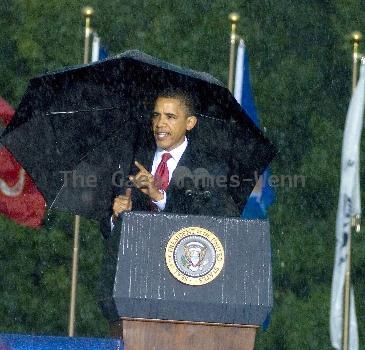Obama widens sanctions by freezing assets of North Korean individuals, firms and agencies
By Robert Burns, APMonday, August 30, 2010
Obama expands sanctions against North Korea
WASHINGTON — The Obama administration on Monday widened the scope of U.S. financial penalties against North Korea, escalating pressure on the Pyongyang regime to give up its nuclear weapons.
The Treasury Department announced it is freezing the assets of several individuals, companies and organizations allegedly linked to Pyongyang’s nuclear program or to management of a vast network of illicit economic activities such as narcotics trafficking and money laundering.
Targeted entities include one variously known as Office 39 or Bureau 39, believed to control organizations inside North Korea and abroad that raise money for senior North Korean leaders. The enigmatic office produces, smuggles and distributes narcotics, the Treasury Department said, and handles the import of luxury goods intended for Kim Jong Il, the top leader.
Treasury said that last year Office 39 was involved in a failed attempt to buy, through China, two Italian-made luxury yachts worth more than $15 million for use by Kim.
In a report earlier this year, the U.S. Army War College’s Strategic Studies Institute said Office 39 is involved in the manufacture and distribution of illegal drugs, the counterfeiting of U.S. currency, and the manufacture and distribution of counterfeit cigarettes.
“The crimes organized by Office 39 are committed beyond the borders of North Korea by the regime itself, not solely for the personal enrichment of the leadership, but to prop up its armed forces and to fund its military programs,” the institute’s report said.
Stuart Levey, the Treasury Department’s undersecretary for terrorism and financial intelligence, told reporters that additional U.S. sanctions would be announced in the weeks ahead.
“The destructive course the North Korean government is charting is facilitated by a lifeline” of illicit activities, Levey told reporters. “The North Korean government helps maintain its authority by placating privileged elites with money and perks such as luxury goods like jewelry, luxury cars and yachts.”
In a new step designed to curb such behavior, President Barack Obama issued an executive order that penalizes certain North Korean activities said to violate U.N. Security Council resolutions.
In a letter to congressional leaders, Obama said these activities include arms sales, money laundering, the counterfeiting of goods and currency, bulk cash smuggling and drug trafficking.
Obama identified three North Korean entities — including Office 39 — and one individual, Lt. Gen. Kim Yong Chol, commander of the intelligence organization involved in conventional arms trade. Any of their assets in the U.S. are now blocked, and Americans are prohibited from doing business with them.
Under an existing executive order, the administration on Monday froze the assets of three other individuals and five other North Korean organizations. Two of those individuals are associated with the nuclear program: Ri Hong Sop, believed to be a former head of the Yongbyon nuclear complex, and Ri Je Son, believed to be director general of the General Bureau of Atomic Energy.
Secretary of State Hillary Rodham Clinton had announced the administration’s intention to expand sanctions against North Korea when she was in Seoul in July. That was in the tense aftermath of the March sinking of a South Korean warship that killed 46 sailors — the worst military attack on the South since the 1950-53 Korean War.
The U.S. and South Korea blamed North Korea, which has denied involvement and threatened to retaliate if it were to be punished.
Clinton said in July that new U.S. sanctions were meant to warn Pyongyang to resist further military provocations.
Separately, the State Department announced that Clinton would meet on Tuesday with former President Jimmy Carter to discuss his trip to North Korea last week. Carter met with North Korean officials to secure the release of an American, Aijalon Gomes (gohmz), who had been held captive for seven months for crossing into the North from China on Jan. 25 for unknown reasons.
State Department spokesman P.J. Crowley said Clinton would thank Carter for undertaking his mission.
Crowley also said that while the Obama administration appreciates North Korea’s willingness to release Gomes on humanitarian grounds, that does not alleviate U.S. concerns about North Korea’s nuclear program.
North Korea, which tested a nuclear bomb in 2006, is believed to have enough weapons-grade plutonium for at least half a dozen atomic bombs and last year revealed it has a uranium enrichment program that would give the regime a second way to make nuclear weapons.
Five nations — China, Russia, South Korea, the U.S. and Japan — have been trying for years to negotiate with North Korea to dismantle its nuclear program in exchange for aid and other concessions.
Pyongyang abandoned those talks last year after the U.N. Security Council condemned the regime for carrying out a long-range missile test. Weeks later, North Korea carried out a second nuclear test.
Tags: Asia, Barack Obama, China, Drug-related Crime, East Asia, Foreign Policy, Greater China, North America, North Korea, Nuclear Weapons, Pyongyang, South Korea, United States, Washington, Weapons Of Mass Destruction

